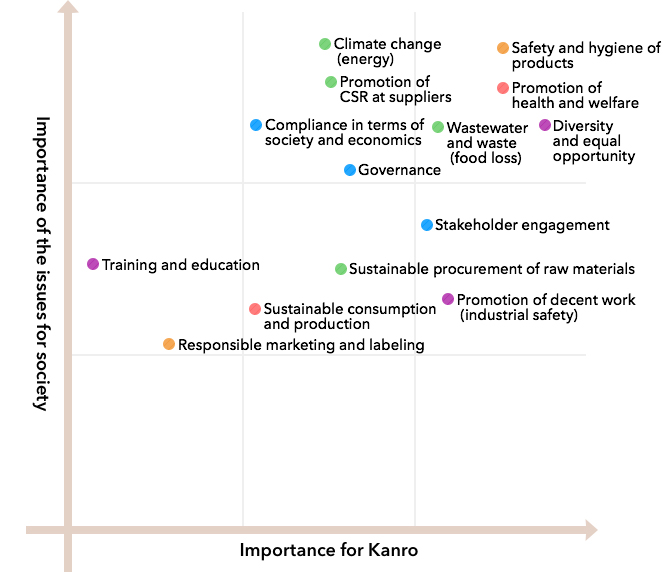Identification of materiality
Kanro aims to contribute to health and a better society through integrity and sweetness, thereby helping to realize a sustainable society.
Kanro engages in CSR activities across four general areas: (1) Social; (2) Environmental; (3) Human Resources; and (4) Corporate Governance.However, social issues are becoming increasingly diverse and complex, and demands under international codes, guidelines, etc., and still keep changing. Under these circumstances, Kanro thought it important to identify and prioritize once again the areas in which we can make contributions through our business. Accordingly, Kanro redefined materiality in FY2018. Going forward, Kanro will engage in unique sustainability activities by setting KPIs for each of the five priority areas.
Process for selecting material issues
- Identify social demands based on various guidelines and codes such as SDGs,* ISO 14001 and GRI Standards
- Conduct interviews with each officer based on the identified social issues
- Identify expectations and demands for Kanro through interviews with external experts
- Approve identified materiality at a Board of Managing Directors meeting
- Set up an internal working group for each of the five priority areas
- Set KPIs for each of the five priority areas
Feedback from experts

Mika Takaoka
Professor, Rikkyo University College of Business
I think it is extremely important for Kanro to promote a correct understanding of sugar, especially about the benefits of sugar.
In the near future, Kanro will see more questions about CSR regarding procurement from suppliers and customers in retail and distribution. It is essential that Kanro incorporates social and environmental standards in procurement. But, the first step is to understand the current situation and risks. In the sense that Kanro exists within an entire supply chain, I think the company will need to comply with Scope 3. Conducting a life cycle assessment may be effective, even for a single product.

Takeshi Shimotaya
Managing Director of Sustainavision Ltd.
At this time, I felt that Kanro needs to raise more awareness of issues related to raw material procurement and the supply chain in the company first. In particular, currently awareness of human rights and labour rights related to corporate activities, and issues related to raw materials procurement has been attracting attention from society, including consumers and civil society which Kanro needs to take into account. From the ESG investment perspective, these points are extremely important when a company would be assessed as its business sustainability. Kanro also needs to make sure of where the raw materials are coming from, how they are manufactured, and what are the social issues and taking countermeasures, as well as how climate change affects our supply chain as an environmental issue, and it is also necessary for Kanro to recognize and take measures against it. The Stakeholder communication/engagement is also very important. Kanro needs to identify important stakeholders and to listen how the stakeholders think about Kanro, and then need to identify its materiality. I hope that Kanro will actively disclose the ESG information of the results and progress of its activities based on the materiality.

Makiko Akabane
CSR Asia Japan Office Director
Ensuring the traceability of important raw materials, such as sugar beets, is important from the perspective of value creation in the Kanro business. Meeting this requirement can lead to greater confidence in quality and in reducing human rights risks in the supply chain. Perhaps Kanro can consider a social contribution approach by encouraging capacity building in raw materials production areas through industry-academia cooperation.
In recent years, there has been a growing focus on waste plastics and other environmental responses to containers and packaging. Many are concerned that response measures, or the lack thereof, may affect trade. Procurement standards among business partners are projected to change, necessitating the steady progress of preparations in advance.
Materiality
Five material issues
Creating value through “sweetness”
Mitigataion of environmental load through business
Safety and reliability of food
Respect for human rights and the promotion of diversity
Corporate governance


KPIs
- Materiality
- KPI
- Creating value through “sweetness”
-
- Provide dietary education on sugar to 1 million people by 2030
- Develop products that contribute to a healthy life
- Contribute to the creation of an environment where everyone in the world can enjoy candy
- Mitigation of environmental load through business
-
- Reduce food waste by 20% (per unit of sales)* compared with 2015 by 2030
- Reduce the CO2 emissions (at production plants) by 20% compared with 2015 by 2030
- Safety and reliability of food
-
- Conduct quality reviews in a planned manner based on the quality risk assessments of the raw material suppliers and manufacturing contractors
- Respect for human rights and the promotion of diversity
-
- Achieve the rate of male employees taking childcare leave of 13% or more by 2021
- Achieve the rate of female managers (section manager or above) of 8% or more by 2021
- Implement “take your child to work day” by 2020 (next generation development support)
- Corporate governance
-
- Hold meetings of the Governance Committee and the Compliance Committee at least twice a year
- Publish corporate reports (integrated reports)
- Hold briefing sessions for individual investors


